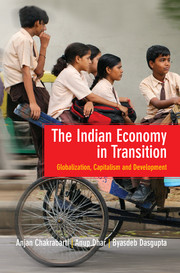Book contents
- Frontmatter
- Contents
- Preface
- Introduction
- Chapter I The Condition of the Working Class in Contemporary India
- Chapter II Capitalism: The ‘Delusive Appearance of Things’
- Chapter III Post-colonial Development and ‘The Thought of the Outside’
- Chapter IV The Word and the World of Neo-liberalism
- Chapter V The Scrypt of Transition: Between the Spectral and the Secret Thereof
- Chapter VI From Self-reliance to Neo-liberalism: The Political Economy of ‘Reform’ (1991–2014)
- Chapter VII Global Capitalism and World of the Third: The Emergent Cartography of the Indian Economy
- Chapter VIII Inclusive Development, State and Violence
- Chapter IX From Economic Crisis to Transition Crisis
- Conclusion
- Bibliography
- Author Index
- Subject Index
Chapter II - Capitalism: The ‘Delusive Appearance of Things’
Published online by Cambridge University Press: 18 December 2015
- Frontmatter
- Contents
- Preface
- Introduction
- Chapter I The Condition of the Working Class in Contemporary India
- Chapter II Capitalism: The ‘Delusive Appearance of Things’
- Chapter III Post-colonial Development and ‘The Thought of the Outside’
- Chapter IV The Word and the World of Neo-liberalism
- Chapter V The Scrypt of Transition: Between the Spectral and the Secret Thereof
- Chapter VI From Self-reliance to Neo-liberalism: The Political Economy of ‘Reform’ (1991–2014)
- Chapter VII Global Capitalism and World of the Third: The Emergent Cartography of the Indian Economy
- Chapter VIII Inclusive Development, State and Violence
- Chapter IX From Economic Crisis to Transition Crisis
- Conclusion
- Bibliography
- Author Index
- Subject Index
Summary
To explain, therefore, the general nature of profits, you must start from the theorem that, on an average, commodities are sold at their real values, and that profits are derived from selling them at their values, that is, in proportion to the quantity of labour realized in them. If you cannot explain profit upon this supposition, you cannot explain it at all. This seems paradox and contrary to every-day observation. It is also paradox that the earth moves round the Sun, and that water consists of two highly inflammable gases. Scientific truth is always paradox, if judged by every-day experience, which catches only the delusive appearance of things.
Karl Marx in Value, Price and Profit, 1969, 77–78The religious world is but the reflex of the real world… The religious reflex of the real world can, in any case, only then finally vanish, when the practical relations of every-day life offer to man none but perfectly intelligible and reasonable relations with regard to his fellowmen and to Nature.
Karl Marx in Capital, 1954: 84One of the defining axes of India's (economic) transition is capitalism. However, approaches to and the context and framework of the term ‘capitalism’ are diverse; diverse are the meanings of capitalism; diverse are the ways in which it is invoked. Clearing somewhat the air on the different ideas and interpretations of capitalism is the objective of this chapter (just like, we had problematized existing ideas and understandings of labour in Chapter 1, and had set up a frame of analyzing labour). Such a ground clearing is necessary to make sense of India's transition. Our subsequent usage of the term capitalism will remain circumscribed by the interpretations presented in this chapter. A parallel concern is the relation of the class-focused approach (elaborated in the previous chapter) to these interpretations of capitalism. We have already seen one interpretation of capitalism in the context of the approach in Chapter 1. Interesting is the question of how class fare in relation to the other interpretations. What is its place in these other interpretations of capitalism? We begin by recognizing three broad conceptualizations of capitalism (which in turn are also related to three ways of conceptualizing ‘reality’).
- Type
- Chapter
- Information
- The Indian Economy in TransitionGlobalization, Capitalism and Development, pp. 42 - 66Publisher: Cambridge University PressPrint publication year: 2015

